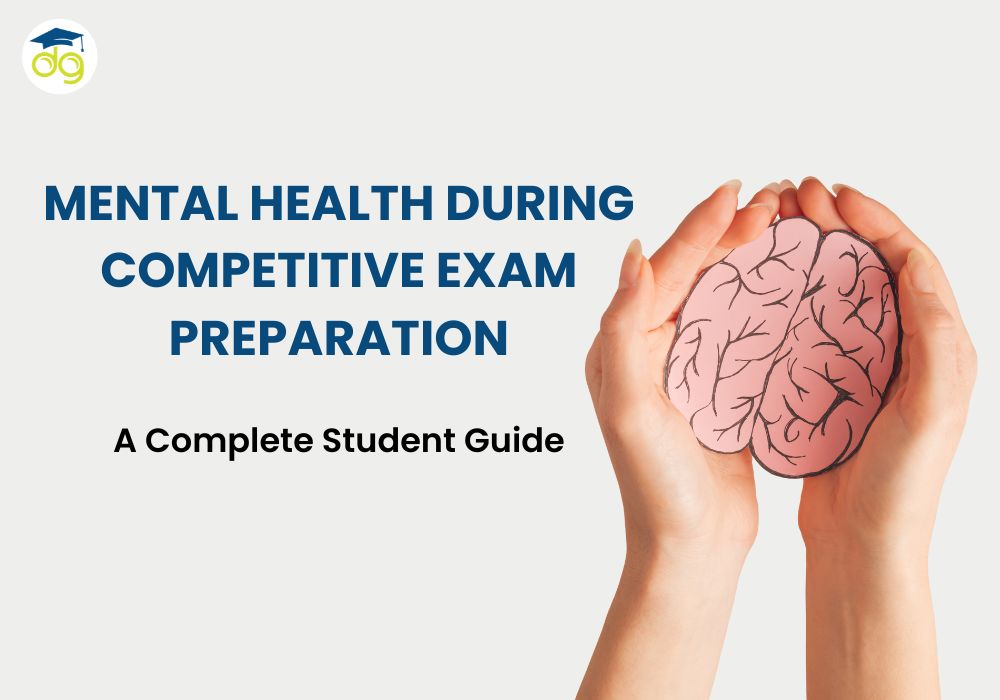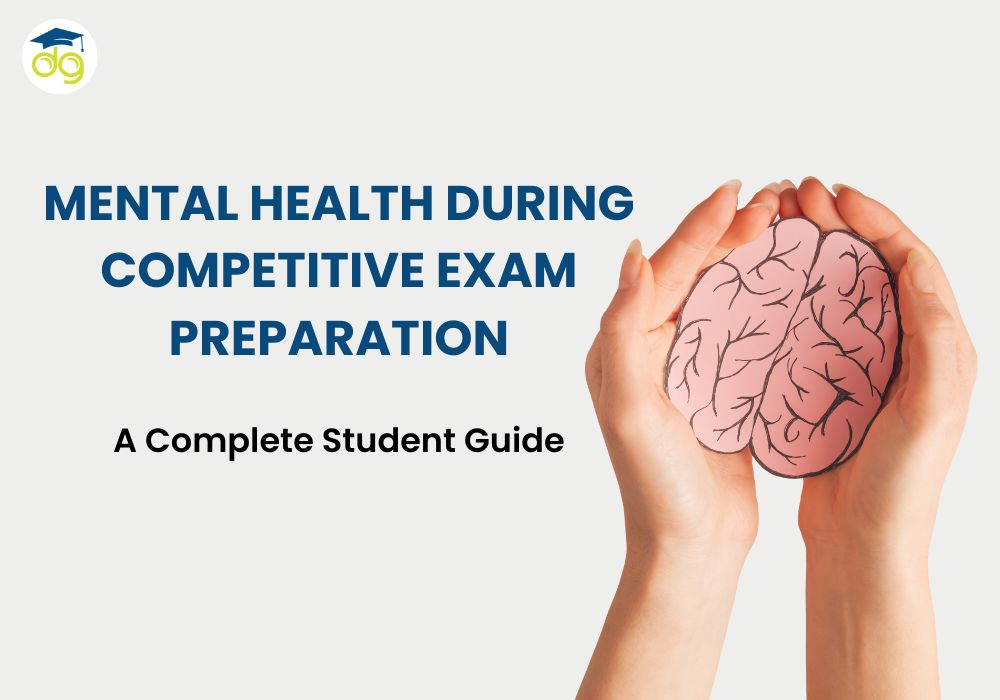Mental Health Tips for Competitive Exam Prep: A Student’s Guide
Learn to manage stress and boost focus during JEE, NEET, UPSC, and more.
Preparation for such huge exams as JEE, NEET, UPSC, SSC, or CLAT can drain your mind. You listen day and day out to long hours of working, the best marks, and expectations. The most crucial thing—your mental health—is suffering.
You may feel tired, exhausted, depressed, or even like giving up. That is not your fault. You are not lazy or weak. You are trying your best. This book is here to make you feel heard and loved. It will teach you actual ways to study quietly, rest frequently, and seek help when needed.
Why Mental Health Matters for Exam Prep
Most people think that they will do better on exams by working harder or longer. That is just half of it. If your brain is fatigued, stressed out, or depressed, your study sessions will fail. Your brain needs sleep and relaxation to learn well.
When your mind is well, you can:
- Focus in class and while studying.
- Remember what you read.
- Finish tasks on time.
- Stay motivated during the whole day.
- Handle fear before exams.
When your mind is overwhelmed, you might:
- Get distracted easily
- Feel sleepy or tired.
- Forget things you studied.
- Keep putting things off.
- Find yourself crying or feeling hopeless.
It is okay to feel stressed. Many students feel this. But ignoring it can make things worse.
Common Mental Health Problems While Studying
Too Much Pressure
You may feel pushed by parents, teachers, or yourself. You worry you might fail them. This creates stress and guilt.
Comparing with Others
Social media can make it seem like everyone else is smarter or finishes earlier. You start believing you aren’t enough, even if you are working hard.
Fear of Not Passing
Thoughts like “What if I fail?” or “What will people think?” can make you panic. It can hurt your sleep and energy.
Burnout from Studying Too Much
Studying for 12–14 hours straight sounds strong, but it can backfire. Your brain may shut down. You might forget things or feel tired all the time.
Loneliness and Isolation
Some students leave home to study in new cities. They stay in hostels or PGs. There are no friends to talk to after class. This can make them feel alone.
These problems are common. They do not mean you are weak. They mean your brain needs some care.
Make a Balanced Daily Plan
Rather than studying nonstop, you can make a plan that includes rest, food, and fun. Stick to it to keep your mind healthy and your studies on track.
Here is a sample plan you can use:
Time | Activity |
| 6:30 – 7:00 AM | Wake up, drink water, do light stretching |
| 7:00 – 8:30 AM | Geometry or Physics revision |
| 8:30 – 9:00 AM | Breakfast + talk to a friend or family |
| 9:00 – 11:00 AM | Study session (use Pomodoro method) |
| 11:00 – 11:15 AM | Break: walk, breathe, or step outside |
| 11:15 – 1:00 PM | Solve practice problems |
| 1:00 – 2:00 PM | Lunch + rest, listen to music or read |
| 2:00 – 4:00 PM | Take a mock test or work on problem areas |
| 4:00 – 4:30 PM | Relax: stretch, take a short walk |
| 4:30 – 6:00 PM | Revise weak sections |
| 6:00 – 7:30 PM | Play, exercise, or a hobby |
| 7:30 – 9:00 PM | Studying again or group discussions |
| 9:00 – 9:30 PM | Dinner + chat with family or friend |
| 10:00 PM | Sleep with lights out, no screens |
You can adjust times to fit your day. The key is a routine with regular breaks, meals, movement, and sleep. Your brain performs best when you're rested.
Smart Study Habits That Help the Mind
Instead of studying late at night, try these easy methods. The Pomodoro Technique means study for 25 minutes. Then take a 5-minute break. Repeat this cycle to keep your mind fresh. It helps avoid tiredness and boredom.
Change subjects often while studying. Switch between hard and easy topics. This keeps things interesting and fun. It stops you from feeling tired of one subject. Your brain stays active with variety.
Focus on only one subject at a time. Don’t try to study many things at once. Multi-tasking makes your attention weak. When you focus on one thing, you learn better. It helps you remember more easily.
Use mind maps to learn ideas clearly. Draw the main points instead of rereading many times. This makes remembering easier and faster. It helps your brain see how ideas connect. Mind maps turn studying into a creative activity.
Turn off your phone and TV before study time. Distractions make it hard to focus. Without distractions, you can concentrate fully. It makes studying more productive. Your brain stays on task longer.
Keep track of what you finish each day. Use a checklist or tick off completed tasks. This shows your progress clearly. It gives you a small feeling of success. Seeing progress keeps you motivated to continue.
Apps That Help You Study and Feel Calm
Technology can support your mind and schedule. Here are some helpful apps: These apps can help you stay calm, set study goals, and manage time better.
App | Purpose | iOS Download Link | Android Download Link |
| Forest | Keeps you focused | Forest iOS | Forest Android |
| Toggl Track | Tracks study time | Toggl Track iOS | Toggl Track Android |
| Notion | Notes + goal checklists | Notion iOS | Notion Android |
| Headspace | Meditation & calm | Headspace iOS | Headspace Android |
| Insight Timer | Free guided meditations | Insight Timer iOS | Insight Timer Android |
| Calm | Sleep stories + relaxation | Calm iOS | Calm Android |
Stop Overusing Screens
Social media and phones may be a time thief and a source of anxiety. Try these:
- Use apps such as Freedom or StayFocusd to suppress apps when studying.
- Put your phone aside for intense study sessions.
- Restrict social media to 15–30 minutes per day.
- Don't have screens 1 hour before bedtime.
- Disable notifications when studying.
These actions allow your mind to wind down and enhance sleep.
When You Should Seek Professional Help
If you notice any of these signs for two weeks or more, talk to a counsellor or professional:
- Feeling sad or empty every day
- Not enjoying things you used to like
- Sleeping too much or very little
- Panic or anxiety that interrupts daily life
- Thinking: “I can’t do this anymore”
These are serious signals. They don’t go away with short breaks. It is okay to ask.
Stories from Real Students
Aarav – JEE Student
He studied 12 hours daily without breaks. Soon, he felt tired and couldn’t remember what he had learned. He added a 30-minute evening walk and call with a friend. He then felt calmer and focused.
Meera – NEET Student
She panicked before the tests. Her counsellor taught her deep breathing and calm thoughts. She found sleep easier, and tests became less stressful.
Rizwan – UPSC Student
He isolated himself from friends to study more. He failed the first time. The second time, he studied with friends and called his family each night. He felt stronger and scored better.
What to Do When You Feel Overwhelmed
Step back for five minutes. Sit in a peaceful and quiet place. Close your eyes and breathe slowly. Concentrate on the air entering and leaving. Allow your mind to unwind without judging.
Speak to someone whom you trust and feel comfortable talking to. He or she could be your friend, brother, or mother. Explain how you truly feel. Allow them to listen to you without judging you. Saying it out loud makes your head clear.
Attempt to have a plain daily regimen. Go to bed at the same time and wake up at the same time. Eat at the same time every day. Schedule fixed study times with short breaks. Routine introduces order in your day and helps to ease stress.
Use useful apps that keep you calm and centred. Forest helps you study without glancing at your phone. Calm and Insight Timer offer brief calming audio. Listen before bedtime or in breaks. These apps get you feeling more in control.
If things aren't getting any better, seek help in time. You may call a counsellor or a mental health hotline. Discussing with the experts provides a new means of feeling better. They will never criticise or judge you. Seeking help shows that you are strong and not weak.
FAQs Students Often Ask
- Can I take study breaks?
Yes. Breaks allow your mind to absorb information. Study with breaks; it's wiser than cramming.
- What if everyone around me is scoring better?
Your path is different. Concentrate on your own growth and dreams, not someone else's.
- How many daily hours of studying should I have?
Quality over hours. A good target is about 6–8 hours with breaks.
- What do I do if I get frantic in front of a test?
Breathe deeply: 4 seconds in, 2 seconds hold, 6 seconds out. Repeat. It keeps your nerves calm.
- Is loneliness in a hostel normal?
Yes, most students feel the same. Form study groups, become pals, or call home daily.
- Can I manage without therapy?
Many students do. But if stress ruins your sleep or concentration, therapy or counselling can make a huge difference.
Conclusion
It's only normal to stress when you're studying for competitive examinations. But stressing too much and neglecting your mind will send you down. You are human. You are not a machine.
- Develop a study, relax, and sleep pattern.
- Take breaks regularly and take care of your body.
- Try time management, focus, and stress apps.
- Phone friends, counsellors, or helplines when you're stuck.
- Get help early, before burnout.
Your mental health is not an obstacle—it’s part of your success. Build strong study habits and a calm mind, and you’ll do better in exams and feel better in real life
If you want more help during our exam preparation journey, visit Skoodos Bridge and find resources specific to your exam.
Categories
Archives
- July 202514
- June 202524
- May 202526
- April 202530
- March 202523
- February 202513
- January 202523
- December 202429
- November 20246
- September 20245
- August 202422
- July 202415
- May 20249
- June 202424
Similar Posts

Mental Health Tips for Competitive Exam Prep: A Student’s Guide
by Skoodos bridge

Career Paths After Government Exams: Beyond IAS & Bank PO Roles
by Skoodos bridge

Language Certifications: A Must-Have for Studying Abroad in 2025
by Skoodos bridge

How AI is Revolutionizing Competitive Exam Preparation in 2025
by Skoodos bridge

How to Balance Board and Competitive Exam Prep Effectively
by Skoodos bridge

Online vs Offline Coaching: Which is Better for Exam Success?
by Skoodos bridge

Top 10 CLAT Coaching Institutes in Raipur for Law Aspirants
by Skoodos bridge

Top 7 Exams After 12th Commerce for High-Salary Career Options
by Skoodos bridge

Top 10 CLAT Coaching Institutes in Amritsar for 2025 Preparation
by Skoodos bridge


Leave a Comment